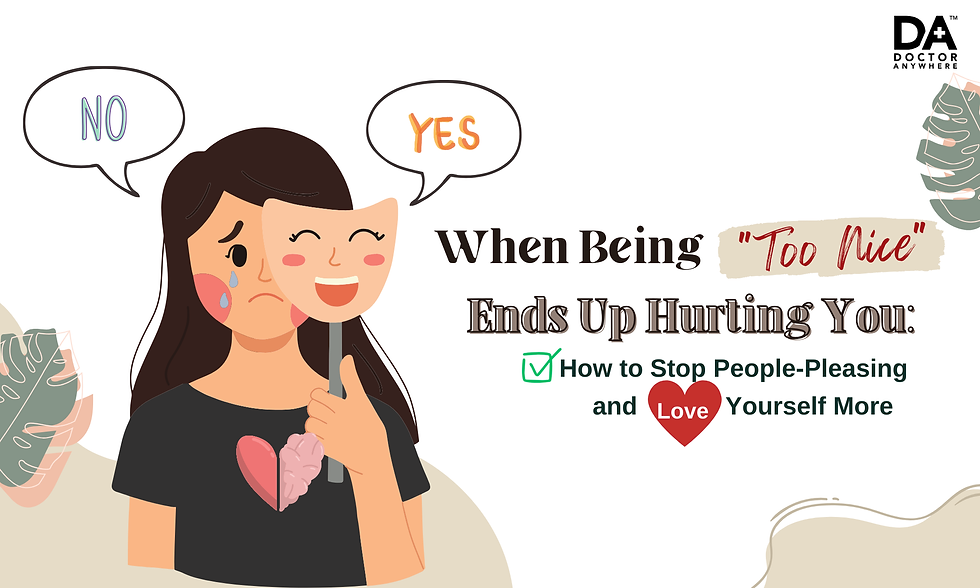Check Now! Are You Addicted to Your Phone?
- Doctor Anywhere Thailand

- Sep 26, 2024
- 2 min read
Updated: Oct 18, 2024

Nomophobia, or the fear of being without a mobile phone, is becoming increasingly common in our interconnected world. It can manifest as anxiety, stress, or even panic when a phone is lost, the battery dies, or you’re in an area without a signal. This anxiety stems from the role that mobile phones play in our daily lives, serving not only as communication tools but also as sources of entertainment, online shopping, mobile banking, and more.
The term "nomophobia" was coined only recently to describe the growing fear of being without a mobile phone. Many experts believe that over-reliance on digital devices could be a form of behavioral addiction, negatively impacting mental health and overall well-being. Being without a mobile phone can leave people feeling disconnected from the outside world, and in a society where constant connectivity is expected, this fear is becoming more prevalent. Over time, the constant need to stay connected through mobile devices may harm our mental health. Therefore, it's essential to be mindful of how much time we spend on our phones.
Behaviors Indicative of Nomophobia:
Constantly checking messages on your phone.
Charging your phone even when the battery is nearly full.
Bringing your phone everywhere, even into the bathroom.
Frequently patting your pocket or bag to make sure your phone is nearby.
Fear of not having Wi-Fi or being unable to connect to mobile networks.
Worrying about not being able to call for help in an emergency.
Using your phone all the time—whether during meals, in the bathroom, while driving, or waiting for public transportation.
In addition to emotional and mental symptoms, those with nomophobia may experience physical symptoms such as rapid breathing, increased heart rate, sweating, trembling hands, or feeling weak or dizzy. In severe cases, these symptoms could escalate into a panic attack.
The Impact of Nomophobia on Daily Life:
Reduced Productivity: Constant phone use can cause distraction at work, school, or during everyday activities, ultimately decreasing overall efficiency.
Sleep Disruption: Excessive phone use, especially before bed, can interfere with sleep cycles, leading to fatigue and reduced focus.
Weakened Personal Relationships: Spending too much time on your phone can reduce face-to-face conversations, leading to strained personal relationships.
Increased Stress and Anxiety: The fear of missing out on updates or being disconnected can heighten stress and anxiety levels.
Physical Health Problems: Prolonged phone use can lead to eye strain, headaches, and a sedentary lifestyle, affecting long-term physical health.
While mobile phones make our lives easier, becoming too attached to them can make us lose sight of the meaningful things around us, such as friends, family, and even ourselves. If you find yourself feeling overly attached to your phone, becoming anxious when you’re not on social media, try spending time doing activities you enjoy with loved ones or consult a mental health professional for targeted and appropriate solutions. Download the Doctor Anywhere app to schedule an appointment with certified specialists anytime, anywhere.




This quiz really made me pause and reflect on my daily habits. It’s surprising how often we reach for our phones without thinking. I realized even while coordinating weekend plans with my friends, wearing our Custom Team Jerseys, I was still mindlessly scrolling. Definitely eye-opening and useful!
With no time limits and smooth gameplay, block blast is perfect for relaxing while still keeping your brain active.
شيخ روحاني
رقم شيخ روحاني
الشيخ الروحاني
الشيخ الروحاني
شيخ روحاني سعودي
رقم شيخ روحاني
شيخ روحاني مضمون
Berlinintim
Berlin Intim
جلب الحبيب
https://www.eljnoub.com/
https://hurenberlin.com/
Ücretsiz rastgele görüntülü gabile sohbet ve cinsel sohbet sorunsuz yeni kişilerle tanışma imkanı sağlar.